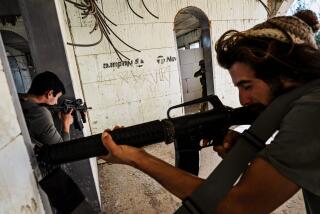Arafat Arrives in Hebron With Vow to Seek ‘Just Peace’
- Share via
HEBRON, West Bank — Palestinian Authority President Yasser Arafat arrived here Sunday to a tumultuous greeting from thousands of jubilant Palestinians and offered a message of peace to the Jewish settlers who remain in their midst.
Arafat, who came to Hebron two days after Israeli troops turned most of the West Bank city over to Palestinian rule, sought to assure the settlers that Palestinians seek “a just peace” with them, not confrontation.
But most of the Palestinian leader’s message was aimed at the sea of cheering, flag-waving people gathered below him as he spoke from the balcony of a hilltop stone fortress bedecked with celebratory banners. Until Friday, the building, now a Palestinian police station, was the main headquarters of the Israeli military here and a hated symbol of its 30-year occupation.
“I declare that the city of Hebron is a liberated city,” Arafat told the crowd, stabbing the air for emphasis. “Now, with the Hebron agreement, we are signing an agreement of peace with all the Israeli people. This is something new.”
The agreement reached Wednesday between Arafat and Israeli Prime Minister Benjamin Netanyahu was later ratified by an overwhelming majority of the Israeli parliament, supported by members of Netanyahu’s rightist coalition as well as the left-wing parties associated with the peace process.
Commentators have said the pact represents an agreement between the Palestinians and “the other half of Israel”--those who voted for Netanyahu and his right-leaning government.
Under terms of the long-delayed deal, about four-fifths of Hebron was turned over Friday to Palestinian control. The rest, an area where about 450 settlers and 20,000 Palestinians live uneasily together, remains under the purview of the Israeli army.
As the crowd, estimated variously at 20,000 to 50,000 people, waited for Arafat on Sunday, a young man climbed to the top of a tall wooden pole and waved an oversized Palestinian flag. Groups of women in traditional embroidered dresses began to chant: “This is the right of the Palestinians. This is our land, our homeland.”
*
When a white-and-green helicopter appeared in the distance, a cheer went up and continued to build as the craft circled and then settled down, precariously close to a few of the spectators. Arafat climbed out, waving and blowing kisses as his motorcade slowly made its way through the crowd to the headquarters.
Surrounded by security officers as he delivered his speech, Arafat vowed to continue working toward the Palestinians’ next goals, which include taking control of remaining areas of the occupied West Bank and establishing an independent Palestinian state with East Jerusalem as its capital.
“A vow is a vow,” Arafat said, making his commitment in the name of Khalil Wazir, the Palestine Liberation Organization official known as Abu Jihad who was assassinated in 1988. “Yes, we will continue until we establish our Palestinian state.”
But he sounded notes of conciliation for Hebron’s Jewish settlers, who have bitterly opposed the agreement because they believe that it endangers their lives and cedes a portion of the Jewish homeland to the Palestinian Authority. “I say to the settlers in Hebron that we don’t want confrontation,” Arafat said.
But settlement leaders reiterated their opposition to the Hebron agreement, and to Arafat himself.
“It is a sad day when a man like Arafat, an international murderer, enters Hebron, the city of our fathers,” said Tzuriel Popovitch, spokesman for the council of Kiryat Arba, a Jewish settlement near Hebron.
In the wake of the Hebron agreement, Netanyahu is conducting an aggressive public relations campaign to shore up American support for the Jewish state, appearing Sunday on interview programs on three U.S. networks.
On ABC-TV’s “This Week,” Netanyahu called previous agreements negotiated by his Labor Party predecessors flawed, saying, “We have to plug a lot of . . . holes” that have left Israelis and their interests insufficiently protected.
Netanyahu said that in further negotiations with Arafat, Israel will determine the positions to which its troops will withdraw and will hold Arafat accountable for the Palestinians’ strict adherence to the terms of agreements.
The Israeli leader also reiterated his Likud Party’s long-held position that no part of Jerusalem will be ceded in negotiations and that the Palestinian entity that results from negotiations must not have sovereign rights, including the right to raise armies.
But for many Palestinian residents of Hebron and surrounding villages, it was not a day for rhetoric but for celebration. Arafat’s arrival was an occasion to leave their homes and offices, take their children and parents and head to the military compound at the city’s highest point.
Mohammed abu Rajab, 32, a civil engineer, said he and other Hebronites were very excited to see Arafat in person, not just on television. “We are very proud of him and expecting more of him. We are looking to him [to lead us] in Jerusalem. Hebron is not the end of the story.”
But one woman in the crowd had more ambivalent feelings. Zahiya Ibrahim Zayed, 48, waited on a crowded rooftop for the Palestinian leader, holding a letter that she hoped to give him.
The carefully folded paper asked him to help her obtain the release of a son arrested by the Israelis the day before and to assist her in caring for other children wounded in an outburst of violence in Jerusalem’s Old City in September.
Given such problems, Zayed said, “I don’t know whether to be happy or sad.”
Times staff writer Melissa Healy in Washington contributed to this report.
More to Read
Sign up for Essential California
The most important California stories and recommendations in your inbox every morning.
You may occasionally receive promotional content from the Los Angeles Times.










